-
Israel’s isolation grows
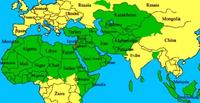
Last Thursday UN General Assembly vote to upgrade the status of the Palestinian Authority to that of a non-state observer highlighted the growing isolation in which Israel finds itself as a result of its policies toward the Palestinians; Israel’s isolation is only going to grow: in response to Israel’s decision to make preparations to build 3,000 housing units in a sensitive area east of Jerusalem, France and the United Kingdom are now considering recalling their ambassadors from Tel Aviv for consultations
-
-
Himalayan glaciers retreating at an uneven rate, making South Asia water supply future unclear

MI6, the U.K. intelligence service, four years ago predicted that the world’s first water war – that is, war between countries over access to water resources — will take place between India and Bangladesh sometime between 2015 and 2020; the reason for the war: intensifying conflicts over dwindling Himalayas water sources; glaciers in the eastern and central regions of the Himalayas appear to be retreating at accelerating rates, similar to those in other areas of the world, while glaciers in the western Himalayas are more stable and could be growing, a new report says
-
-
Toilet Challenge, 1: Caltech’s solar-powered toilet wins Reinvent Toilet Challenge
The World Health Organization reports that 2.5 billion people around the globe are without access to sanitary toilets, which results in the spread of deadly diseases; every year, 1.5 million people, mostly those under the age of five, die from diarrhea; Caltech scientist awarded grant to develop solar-powered sanitation system
-
-
U.S. losing patience with Pakistan over Haqqani network’s growing boldness
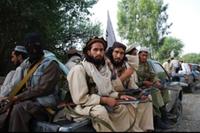
Last week the Pakistan government-supported Haqqani network released a video of a 1 June operation, showing members of the group driving an explosive-laden truck into Camp Salerno, an American military base in Afghanistan, near the Pakistani border; the truck exploded, opening a breach in the camp’s fence, through which Haqqani militants entered the camp, shooting in all directions; only two GIs died in the attack — but it could have been far worse, as hundreds of American soldiers were in the mess hall only yards away; Congress has already voted to designate the Haqqanis as a Foreign Terrorist Organization (FTO), and administration officials say that the United States is “one major attack” away from unilateral action against Pakistan
-
-
By the numbers: Terrorism and the Olympics
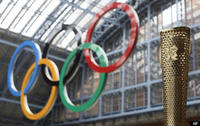
The 2012 Summer Olympic Games open today in London; history offers a warning, but no clear pattern on the true risk of terrorism at the Olympic Games, concludes a new report
-
-
U.S. to send hand-launched UAVs to Kenya to help fight Somali al Shabaab
The United States will include hand-launched Raven UAV’s in the $41.4 million military aid package to Kenya; the package also includes trucks, communications gear, and rifles for Burundi, Djibouti, and Uganda; the military aid aims to help east African countries cope with the growing menace of al Shabaab, a Somali al Qaeda affiliate
-
-
Short-sighted Tuareg leadership dooms independence quest
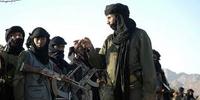
With the quickening pace of preparations for a military intervention to remove an al Qaeda-affiliated Islamist group from a break-away region of Mali, and disrupt this group’s plan to turn the region into what African leaders call “Africanistan,” the leaders of the MNLA, the Tuareg movement which fought for the independence of the region, said the MNLA would not participate in the operation against the Islamists unless it receives guarantees from outside powers that the goal of the operation will not be to re-unify Mali; the cause of Tuareg independence never had much support among the Tuareg people, and was resolutely opposed by neighboring states; the MNLA refusal to help in removing the Islamists from Azawad all but guarantees that the dream of Tuareg independence will remain just that – a dream
-
-
More generals defecting, worries about Syria’s chemical munitions
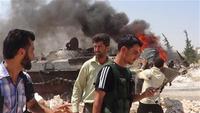
A few more Syrian generals defected to Turkey this weekend; the latest defections indicate a growing problem for the regime, as those defecting come from parts of the military where loyalty to the Assad family was key to promotion; among the defectors were two Alawite generals who were operations commanders of the Alawite Shabiha militia, one of the military units closest to Assad, a third general, a Sunni, headed the Syrian chemical warfare authority until 2008; last Thursday, Syria began to move chemical munitions from storage facilities to areas closer to the fighting; the United States informed Syria that Washington would view with extreme concern the removal from storage of any more chemical weapons
-
-
Competition among political forces, not religious fundamentalism, inflames anti-Americanism in the Muslim world

Historically, domestic political divisions within Muslim politics have fallen between secular elite and fundamental Islamic elite factions, with both groups laying claims to anti-American grievances; that competition is most intense not in the most deeply observant Islamic countries, but rather in countries where divisions between secular and religious factions are sharpest; in those countries, competition between political forces — not religious fundamentalism — appears to spark the greatest anti-American sentiment
-
-
UN includes Iran in drafting treaty aiming to stop arms proliferation to terrorists, rogue states

The UN Conference of the Arms Trade Treaty is tasked with drafting an international treaty aimed at stopping arms proliferation to terrorist groups and rogue states; the UN appoints Iran to be one of the vice presidents of the committee; the UN Watch watchdog groups says that appointing Iran to oversee the drafting of a treaty dealing with sending arms to terrorists “is like choosing Bernie Madoff to police fraud on the stock market”
-
-
U.S., Canada issue a joint statement of privacy principles
The United States and Canada issue a joint statement about the two countries’ perimeter security approach; the statement aims to reassure Canadians that their privacy rights would not be sacrificed to satisfy the U.S. security demands
-
-
Mali crisis deepens as Islamists tighten grip over breakaway Azawad
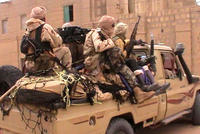
The al Qaeda-affiliate Ansar Dine extended its control of Azawad, the Mali break-away region, by wresting control of the city of Gao from rival Tuareg forces; Mali’s neighbors announce that they have troop commitments from three west African countries for a military operation against Azawad Islamists; an advance party of European military and civilian security advisors is already operating in northern Niger in preparation for the military campaign, and behind-the-scenes discussions at the Security Council will soon yield a UN resolution authorizing the African Union to sent military forces to Azawad to oust the Islamists and reunify Mali
-
-
Morsi faces tough decisions

On Sunday, the Muslim Brotherhood’s candidate, Mohammed Morsi, was declared the winner in Egypt’s first free elections, defeating General (Ret.) Ahmed Shafiq, who served as Hosni Mubarak’s last prime minister; Morsi faces many issues and problems on the domestic front and about Egypt’s regional relations – among them: the role of the military in Egypt’s life, the degree of Islamization in Egypt, the deteriorating the security situation in the Sinai, and Egypt’s regional role
-
-
Countdown begins to attack on Iran
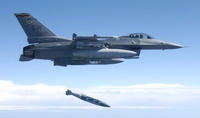
On Tuesday in Moscow, the third round of talks between the P5+1 (the five permanent members of the Security Council plus Germany) and Iran over Iran’s nuclear program ended with the gap between the two sides as wide as ever; there are no plans for more meetings; this means that on 1 July, a new, crippling round of sanctions will be imposed on Iran; the previous round of sanctions de-linked Iranian banks and companies from the international banking system; the coming round of sanctions – which includes, among other things, the removal of insurance from tankers carrying Iranian oil – will bring an end to nearly all of Iran’s oil sales, sales which account for nearly 80 percent of Iran foreign revenues; planning, in both Israel and the United States, for an attack on Iran’s nuclear facilities has now shifted to a higher gear; Congress holds hearings on Israel’s Iran-specific military equipment needs
-
-
Mali’s neighbors ready military operation to oust Azawad Islamists, unify Mali
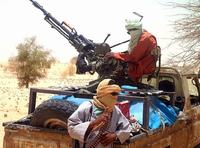
Mali’s neighbors, increasingly anxious about break-away Azawad turning into a haven for Islamic militants, worried about waves of refugees fleeing the strict Sharia law imposed in the territory by the fundamentalist Ansar Dine group, and unconvinced of the ability of the fractured and weak Mali government to tackle the situation anytime soon, are planning to seek a UN Security Council resolution authorizing a military campaign by a coalition of west African countries to oust the Islamists and help reunify Mali; the coalition, led by Niger, is seeking French and U.S. logistical and operational support for the campaign
-
More headlines
The long view
No Nation Is an Island: The Dangers of Modern U.S. Isolationism
The resurgence of isolationist sentiment in American politics is understandable but misguided. While the desire to refocus on domestic renewal is justified, retreating from the world will not bring the security, prosperity, or sovereignty that its proponents promise. On the contrary, it invites instability, diminishes U.S. influence, and erodes the democratic order the U.S. helped forge.
Fragmented by Design: USAID’s Dismantling and the Future of American Foreign Aid
The Trump administration launched an aggressive restructuring of U.S. foreign aid, effectively dismantling the United States Agency for International Development (USAID). The humanitarian and geopolitical fallout of the demise of USAID includes shuttered clinics, destroyed food aid, and China’s growing influence in the global south. This new era of American soft power will determine how, and whether, the U.S. continues to lead in global development.
Water Wars: A Historic Agreement Between Mexico and US Is Ramping Up Border Tension
As climate change drives rising temperatures and changes in rainfall, Mexico and the US are in the middle of a conflict over water, putting an additional strain on their relationship. Partly due to constant droughts, Mexico has struggled to maintain its water deliveries for much of the last 25 years, deliveries to which it is obligated by a 1944 water-sharing agreement between the two countries.
How Disastrous Was the Trump-Putin Meeting?
In Alaska, Trump got played by Putin. Therefore, Steven Pifer writes, the European leaders and Zelensky have to “diplomatically offer suggestions to walk Trump back from a position that he does not appear to understand would be bad for Ukraine, bad for Europe, and bad for American interests. And they have to do so without setting off an explosion that could disrupt U.S.-Ukrainian and U.S.-European relations—all to the delight of Putin and the Kremlin.”
